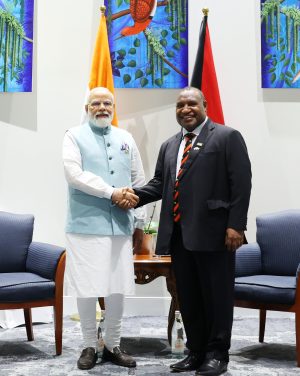In a rare display of affection and respect, Papua New Guinea’s Prime Minister James Marape touched the feet of Indian Prime Minister Narendra Modi as he stepped on to the island’s soil ahead of the Third Summit of the Forum for India-Pacific Islands Cooperation (FIPIC) on May 22. Marape literally rolled out the red carpet for Modi, making an exception to a local rule of not welcoming visitors after sunset.
India’s engagement with the 14 Pacific Island countries (PICs) is critical. FIPIC members include Cook Islands, Fiji, Kiribati, Marshall Islands, Federated States of Micronesia, Nauru, Niue, Samoa, Solomon Islands, Palau, Tonga, Tuvalu, and Vanuatu as well as this year’s host, Papua New Guinea. Many of these states also have growing or somewhat dubious relationships with China. Regional engagement is a part of India’s Act East Policy, which for PICs includes development assistance through South-South cooperation, loan assistance, capacity building, and grants.
Modi’s visit was serendipitous in the absence of U.S. President Joe Biden, who canceled his trip to Papua New Guinea and to the Quad meeting in Australia to attend to the debt ceiling crisis in Washington. Biden’s visit would have been the first visit by a sitting U.S. president to the island, or indeed, any Pacific Island nation. Instead, Biden invited Marape to Washington later this year.
Biden’s sudden cancellation occurred at a time of growing Chinese attempts to reshape the geopolitical dynamic in the Indo-Pacific, where PICs are often the most vulnerable to regional crises and aggressive forms of diplomacy. The Chinese security arrangement with Solomon Islands, which attempts to build the Solomons’ security capacity and holds open the possibility for Chinese security forces to deploy to the country, also potentially threatens Australia, which is just 2,000 kilometers away.
Chinese engagement in the Indo-Pacific has, in the past, put India on the back foot. China has its own set of regional fora, including the China-Pacific Island Countries Economic Development and Cooperation Forum, where Beijing has lavished aid in areas of poverty reduction, COVID-19 response, and climate change adaptation. Solomon Islands received a $500 million aid package in 2019, arguably in exchange for terminating its diplomatic ties with Taiwan. Beijing is nearing Australia in becoming the largest aid provider in the Pacific.
In contrast, the U.S. approach, encapsulated by Obama’s embarrassing “pivot” to Asia and Biden’s conspicuous absence from Papua New Guinea, pales in comparison. It is only recently that Biden and the G-7 committed to addressing some of the needs of small island states such as climate change, and the grouping’s joint communique was less committed to their specific needs than to containing China and ending the war in Ukraine.
These conditions only added to the importance of Modi’s visit to Papua New Guinea. In his speech this weekend before FIPIC participants, Marape reminded India and others of their shared heritage, noting, “We all come from a shared history, a history of being colonized by colonial masters. History that holds the nations of the Global South together.” Marape also laid the leadership mantle for the Global South at Modi’s feet, suggesting that India was now the “leader of the third world,” an important symbol of India’s growing status in the region as it leads the G-20 this year.
Papua New Guinea is not only significant strategically for India, but it has both a strong trade relationship with New Delhi and is home to a significant Indian population. India has maintained close contact with Papua New Guinea and many of the other PICs, signing an agreement this week on cooperation in small-to-medium sized enterprises and in the past working on areas of technical cooperation on clean energy, solar power, and climate change adaptation and mitigation.
The island state has also been a showcase for Indian diplomacy, such as a recent $100 million line of credit for infrastructure, and the creation of a “human-centric globalization,” as stated by External Affairs Minister S. Jaishankar, in which India can contribute to critical resource and structural issues such as poverty, violence, and health capacity. These are particularly important in Papua New Guinea, where, as of April 2020, almost 40 percent of the population live below the poverty line and where gender-based violence is an epidemic. While Modi may not yet be able to match China’s reach with credit and resources, Modi’s good fortune, while it comes at the expense of Biden, amounts to a home run for public diplomacy.

































